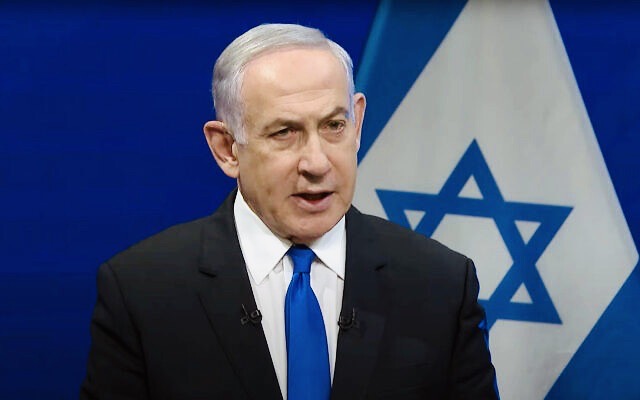The rift between Joe Biden and Benjamin Netanyahu over the Israel-Hamas war is growing wider and is looking increasingly worrisome from Israel’s perspective.
The tensions that have erupted in the last few months feel like a replay of Israel’s duels with the United States over the past six decades.
David Ben-Gurion and Dwight Eisenhower clashed over the 1956 Sinai war. Ben-Gurion and John Kennedy were at odds over Palestinian refugees and Israel’s nuclear ambitions. Gerald Ford threatened to withhold arms from Israel if it did not pull out of a certain sector of the Sinai Peninsula. Menachem Begin and Ronald Reagan argued over Israel’s annexation of the Golan Heights, its invasion of Lebanon, and its bombing of Iraq’s nuclear reactor. Begin and Jimmy Carter quarrelled over an Israeli withdrawal from the West Bank. Yitzhak Shamir and George H.W. Bush agreed to disagree over the question of Israeli settlements in the West Bank.

More recently, Netanyahu ran afoul of Barack Obama, who called for Israel’s withdrawal from the West Bank, lambasted the expansion of Israeli settlements there, and endorsed a two-state solution.
Today, with the war in Gaza more than five months old, the president of the United States and the prime minister of Israel are sparring over several interrelated issues, all of which are straining Israel’s strategic relationship with its most important ally.
Biden and Netanyahu find themselves at loggerheads over five interrelated matters:
The mounting humanitarian crisis, which has claimed the lives of an unprecedented number of Palestinian civilians. Israel’s plan to invade Rafah, Hamas’ last urban stronghold in the Gaza Strip. The prospect of a pause in the fighting, which is enmeshed with an exchange of Israeli hostages and Palestinian prisoners. The future of Gaza after the guns go silent. The notion of a two-state solution, which is linked to a historic rapprochement between Israel and Saudi Arabia and Israel’s greater integration into the Middle East.
These issues, if resolved, could extinguish two flashpoints that are currently stirring regional tensions.
Hezbollah, an ally of Hamas and Iran’s chief proxy, has promised to end its low-intensity conflict with Israel along the Lebanese border and inside Lebanon if hostilities in Gaza cease. Hezbollah, which ignited a major war with Israel in 2006, initiated the fighting out of solidarity with Hamas.
The Houthis in Yemen, in support of Hamas, have fired missiles and drones at cargo ships passing through the Red Sea and the Gulf of Aden. They will stop their aggression once the war in Gaza has ended, they have said.
Amid these conflicts, the United States and Israel have been inexorably pulled into a spiralling dispute over Israel’s military and political strategy in Gaza.
The Biden administration basically supports Israel’s goal of dismantling Hamas and removing it as Gaza’s governing authority. But with the civilian death toll in Gaza having reached unprecedented heights, and with Biden’s popularity plunging among Arab Americans, African Americans and younger progressive white Americans due to his support of Israel, Biden and his handlers fear he may lose battleground states that previously supported him. If this scenario unfolds, Biden’s Republican rival, Donald Trump, may well eke out a victory in next November’s presidential election.

Cognizant of these realities, Biden has branded Israel’s air campaign in Gaza as “indiscriminate” and “over the top” and has gradually sharpened his critique of Israel.
U.S. Secretary of State Antony Blinken has elaborated on this theme, having said that protecting and aiding civilians must be Israel’s “job number one” at this juncture of the war. As he put it a few days ago, “We look to … Israel to make sure this is a priority. Protecting civilians, getting people the assistance they need — that has to be job number one, even as they do what is necessary to defend the country and to deal with the threat posed by Hamas.”
Biden, in his latest speeches, Biden has also lectured Israel on the need to minimize Palestinian civilian casualties. As of March 13, 31,300 Palestinians, including combatants, had been killed
In one of his most recent references to Netanyahu, Biden said, “He has a right to defend Israel, a right to pursue Hamas, but he must, he must, he must pay more attention to the innocent lives being lost as a consequence of the actions taken.”
“In my view, he’s hurting Israel more than helping Israel,” he added in an allusion to Israel’s growing global isolation. “It’s contrary to what Israel stands for, and I think it’s a big mistake. So I want to see a ceasefire.”
Until very recently, Biden and top-ranking U.S. officials avoided the use of the word “ceasefire,” knowing that Israel will not submit to a truce until Hamas is soundly defeated. In general, advocates of a ceasefire tend to be Palestinians, Arabs and Muslims and their supporters. Hamas itself has consistently demanded a permanent ceasefire, even though it broke a succession of ceasefires between 2009 and 2023.
That said, it is still unclear whether Biden favors a temporary ceasefire of a few weeks to facilitate the release of at least some of the 130 hostages, six of whom are American citizens, or whether he is thinking of something more permanent.
Whatever the case may be, Biden has grown impatient with Netanyahu, and in private he has reportedly denounced him as an “asshole.”
The U.S. vice-president, Kamala Harris, has been outspoken as well. She has said that the United States will continue to “stand for the security of Israel and its people.” But in a none too subtle jab at Netanyahu, she has drawn a distinction between “the Israeli government” and “the Israeli people.” As she noted, The Israeli people are entitled to security, as are the Palestinians. In equal measure.”
Biden and several of his cabinet ministers, notably Blinken and Secretary of Defence Lloyd Austin, have asked Israel to alter its military tactics in Gaza so that they are more surgical and less devastating in nature.
Biden, too, has denounced Netanyahu’s far-right coalition government and insisted that Israel should open more land crossings for humanitarian assistance to enter Gaza. In his State of the Union speech, he announced plans to build a temporary port — a pier and a causeway — on Gaza’s coast to facilitate the direct delivery of aid. This multimillion dollar project, which will be supported by about 1,000 U.S. troops, is supposed to be completed within two months.
The president has pushed for a pause in the war to ensure that supplies reach the 2.3 million Palestinians of Gaza, 85 percent of whom have been displaced from their homes since the outbreak of the war on October 7, the day Hamas terrorists murdered 1,200 Israelis and foreigners in a terrorist rampage in southern Israel.
A deal has not been reached until now mainly because Hamas seeks a long-range ceasefire, an end to the war and the withdrawal of Israeli forces from Gaza. These maximalist demands are completely unacceptable to the Israeli government and the vast majority of Israelis.
Biden has warned Israel that it must come up with a viable plan to protect civilians in Rafah before it launches an invasion. Israel has said it will evacuate many of its residents to “humanitarian islands” in the center of Gaza that will provide them with all necessities.
According to the Politico news, U.S. officials have informed Israel that the Biden administration would support a limited Israeli operation in Rafah that would prioritize “high-value” Hamas targets rather than a massive offensive.
U.S. officials have also told Politico that Biden would consider placing conditions on future military aid to Israel if it violates this “red line” and moves into Rafah without such a plan. Biden, however, reportedly has said he would not deprive Israel of defensive military equipment such as Iron Dome missile interceptors.
On March 12, Biden’s national security adviser, Jake Sullivan, denied that he had set any “red lines” for Israel. “The president didn’t make any declarations or pronouncements or announcements,” he said.
But a few days ago, seven Democratic senators, including Bernie Sanders, urged Biden to stop sending offensive weapons to Israel. Sanders said that their recommendation does not apply to defensive weapons like the Iron Dome: “Israel has a right to defend itself, but Israel does not have … the right to go to war against the entire Palestinian people.”
In response to these critiques, Netanyahu has challenged Biden’s assessment of the situation on the ground, having said that the policies he is pursuing represent “the wish of the majority of Israelis” and are not “private policies against the majority.”

As far as Rafah is concerned, Netanyahu insists that if Israel is to win the war, it “must destroy the remaining (four) Hamas battalions in Rafah. “If not, Hamas will regroup, rearm and reconquer Gaza.”
“That would be an intolerable threat to our future, and we will not accept it,” he added. “We will destroy Hamas, free our hostages, and ensure that Gaza doesn’t pose a threat to Israel again.”
Netanyahu claims that disagreements with the United States will make it harder for Israel to defeat Hamas. “To the extent that Hamas believes that there’s daylight between us, that doesn’t help,” he said. On the other hand, when Israel and the United States are on the same page, Israel is better positioned “to achieve victory” and facilitate the release of the hostages, he said.
Netanyahu has a “red line” as well. “The red line is that October 7 doesn’t happen again. Never happens again.”
In his view, Israel can finish the war within two months. “Maybe six weeks, maybe four,” he said. On March 12, Netanyahu said, “Let me be clear. Israel will win this war, no matter what.”
Apart from these issues, Biden’s vision for “the day after the war” clashes with Netanyahu’s outlook.
Biden envisions a revitalized and reformed Palestinian Authority governing Gaza, but Netanyahu has rejected a role for it, saying it has yet to condemn the October 7 massacre. Netanyahu has said that Israel must maintain security in Gaza for an indefinite period. Biden has warned Israel not to reoccupy Gaza. Biden thinks that Israel should support a pathway to Palestinian statehood, which could well lead to a normalization of relations between Israel and Saudi Arabia. Netanyahu is firmly opposed to a Palestinian state, though he yearns for normal ties with the Saudis.
Netanyahu’s troubled relationship with Biden is a reflection of the eroding support for Israel in the Democratic Party.
In a paper, the Institute for National Security Studies in Tel Aviv says, “While the Democratic Party has historically been the political home for the vast majority of American Jews, the party’s support for Israel has declined over the past decade … This diminishing support for Israel is particularly tied to the ‘millennial support’ within the Democratic Party for the Palestinian cause. Young Democrats overwhelmingly support the Palestinians, while older Democrats are more favorable to Israel. Even among younger Republicans and Independents, sympathy for Israel has declined, marking a sharp break from their older counterparts.”
The United States as a society is clearly changing, and not necessarily in Israel’s favor. This is something that Israel should factor into its calculations in the years ahead.
